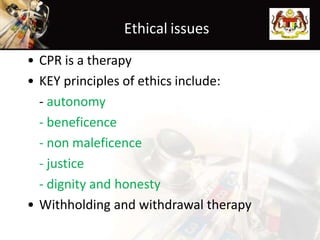Ethical issues
- 2. Ethical issues âĒ CPR is a therapy âĒ KEY principles of ethics include: - autonomy - beneficence - non maleficence - justice - dignity and honesty âĒ Withholding and withdrawal therapy
- 3. Ethical principles â Patient Autonomy âĒ Recognized ethically and legally âĒ Right of patient to accept or refuse treatment âĒ Applied to those capable of making decision âĒ Decision based on understanding of disease, patient condition, nature of treatment, alternative therapy, risks and benefits
- 4. Ethical principles â Beneficence Benefit provided to patient while balancing risks and benefits Are we providing benefit to patient or are we just delaying death and prolonging suffering?
- 5. Ethical principles â Non-maleficence Do no harm, or further harm - CPR should not be initiated in futile cases
- 6. Ethical principles â Justice Duty to distribute limited health resources equally within a society, and the decision of who gets what treatment If resuscitation is provided, it should be available to all who will benefit from it within the available resources
- 7. Ethical principles â Dignity and Honesty Patientâs right to be treated with dignity Honesty in revealing information
- 8. Ethical principles Advanced directives âĒ âLiving willâ, wishes or expression for end of life care âĒ Based on conversational or written directives âĒ Periodic consideration needed as patientâs desire and condition may change
- 9. Ethical principles Surrogate decision maker âĒ âNominatedâ decision maker when patient is incapable of making one âĒ Spouse, adult child, parent, close relative âĒ ? friend
- 10. MEDICAL FUTILITY âĒ When an intervention is highly unlikely to benefit the patient or âĒ When an intervention does not achieve patientâs intended quality goals or physicianâs physiological goals âĒ Key determinants - Length - Quality of life
- 11. PRINCIPLE OF FUTILITY âĒ Withholding resuscitation and discontinuation of life-sustaining treatment during or after resuscitation are ethically equivalent âĒ If the prognosis is uncertain, a trial of treatment should be considered while further information is gathered to help determine the likelihood of survival and expected clinical course
- 12. When Not to Start CPR âĒ Advanced directives by patient or surrogate decision maker âĒ Valid DNAR by attending physician âĒ Obvious signs of death e.g. Rigor mortis âĒ Algo mortis - steady lowering temperature âĒ Injuries incompatible with life
- 13. When NOT to Stop âĒ Drug intoxication âĒ Hypothermia âĒ Ventricular fibrillation
- 14. When to Stop CPR âĒ Return of spontaneous circulation (ROSC) âĒ Too exhausted to continue, or dangerous âĒ Obvious signs of death are apparent âĒ Decision to cease resuscitation effort are often made on a case to case basis
- 15. THANK YOU NATIONAL COMMITTEE ON RESUSCITATION TRAINING SUBCOMMITEE FOR ADVANCED LIFE SUPPORT ï§ Dr Tan Cheng Cheng ï§ Dr Luah Lean Wah ï§ Dr Ismail Tan ï§ Dr Wan Nasrudin ï§ Dr Chong Yoon Sin ï§ Dr Priya Gill ï§ Dr Ridzuan bin Datoâ Mohd Isa ï§ Dr Thohiroh Abdul Razak ï§ Dr Adi Osman














